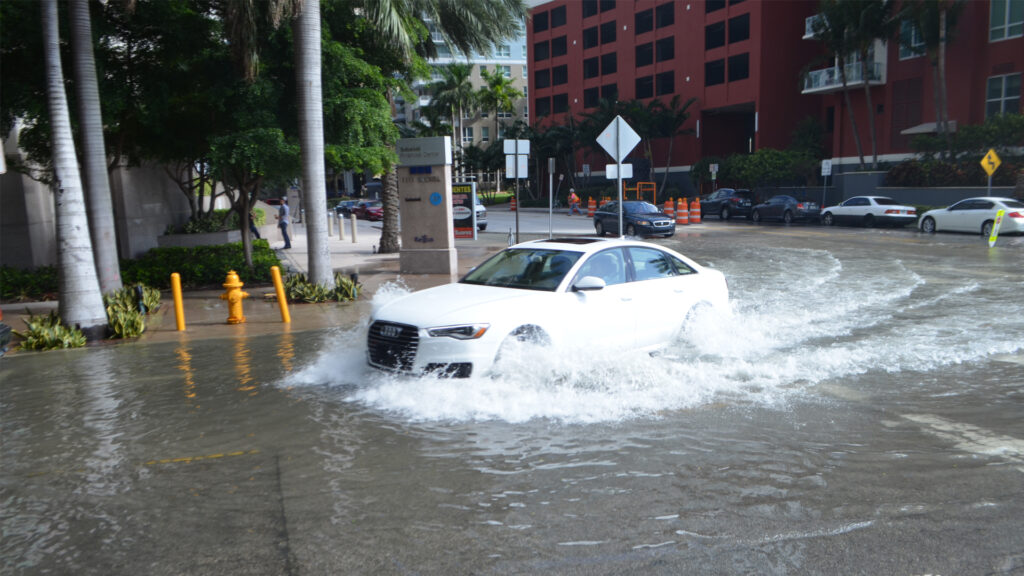By Will Charouhis, We Are Forces of Nature
In a twist of fate, the United Nations convened its first high-level plenary meeting on “Addressing the Existential Threats Posed by Sea Level Rise” just hours before Hurricane Helene started flooding parts of Florida.
Across the globe, seas are rising faster than at any time in the last 3,000 years. With more than 900 million people living in coastal communities, as emissions increase, temperatures rise, glaciers melt and oceans expand, the losses will be staggering.
Rising seas will erode coastlines, destroy crops, displace millions, contaminate fresh water, damage infrastructure and decimate economies. Yet studies show that of all the cities in the world, Miami has the most to lose from sea level rise.

With the third-largest school district in the United States and nearly 2.8 million people living near sea-level, Miami has more students facing the impacts of impending sea rise than anywhere else in the nation.
So, as a Miami native, I looked forward to what I hoped would be a breakthrough forum of progress and solutions last month at the U.N. General Assembly. But as one expert after another took the stage and exposed alarming stats, my characteristic optimism faded.
Speaking on behalf of the Marshall Islands, President Hilda Heine declared that while “we are too late to prevent rising seas from eating away at our shores, we will not go silently to our watery graves.” One of the world’s lowest-lying island nations, researchers say parts of the Marshall Islands will be uninhabitable by as early as 2035.
President Sylvanie Burton of Dominica silenced the crowd with the devastating reality faced by island states. In 2015. Tropical Storm Erika wiped out 96% of Dominica’s gross domestic product (GDP); in 2017 Hurricane Maria destroyed over 225% of the GDP; and this year Hurricane Beryl, flattened the neighboring island-nations of Grenada, Barbados and Jamaica, and destroyed more than 90% of the homes on St. Vincent.
The comments were underscored by a report just released by NASA that for many, is too little too late: We’ve heated the planet so much that regardless of whether greenhouse gas emissions change in the coming years, we’ve likely ceded the fate of the many island nations, where sea rise is now deemed irreversible.
And speaking for the Alliance of Small Island States, Samoa’s Prime Minister Mataʻafa lamented: “We contributed almost nothing to this global scourge, but it is our land that is being consumed by the sea.”
U.N. Secretary-General António Guterres spoke of the climate inequities faced by the poorest communities. While the Group of 20, which includes countries with the world’s largest economies, contributes 80% of global emissions, millions of families in Panama, Bangladesh and Senegal have been affected this year by the encroaching seas.

The landmark plenary was a start. It laid the groundwork for loss and damage discussions to ramp up at the 29th annual United Nations Climate Change Conference (COP29). There should also be discussions on the cooperative use of artificial intelligence and other innovative approaches for monitoring and risk analysis, and an agreed upon General Assembly declaration on sea level rise in 2026.
But as Guterres closed his remarks with a plea that “we cannot leave the hopes and aspirations of billions of people dead in the water,” the first bands of Hurricane Helene hit my home state. Thousands of homes flooded and more than 1.5 million people lost power.
The youth representing my organization, We Are Forces of Nature, left the U.N. General Assembly with a mix of hope and fear. Next up, this November we’ll head to COP29 in Azerbaijan with the hope that world leaders will come together and take action to ensure humanity’s survival.
But for some, time has already run out.
Will Charouhis is an 18-year-old climate activist from Miami and the founder of We Are Forces of Nature, a youth-led organization aiming to slow climate change. Banner image: A submerged shoreline with exposed rock and fallen or dead trees on the coast of Nggatokae Island in the Solomon Islands. (Alex DeCiccio, CC BY-SA 4.0, via Wikimedia Commons)
If you are interested in submitting an opinion piece to The Invading Sea, email Editor Nathan Crabbe at ncrabbe@fau.edu. Sign up for The Invading Sea newsletter by visiting here. To learn more about what causes sea level rise, watch the video below.




A 2020 study forecasts 171 million people and $8.8 Trillion in assets will be exposed to coastal flooding (see Table 1). https://www.nature.com/articles/s41598-020-67736-6/tables/1
This study accounts for historic coastal damage and predicts increased damage due to rising sea levels. While inundation and submersion (e.g., island nations) are one way to see the problem, most impacts result from amplification of tide, storm surge, soil salinization, etc.
The problem is well understood. Is it time to consider how to prevent impacts while taking responsibility for reversing the root cause(s) of climate change?